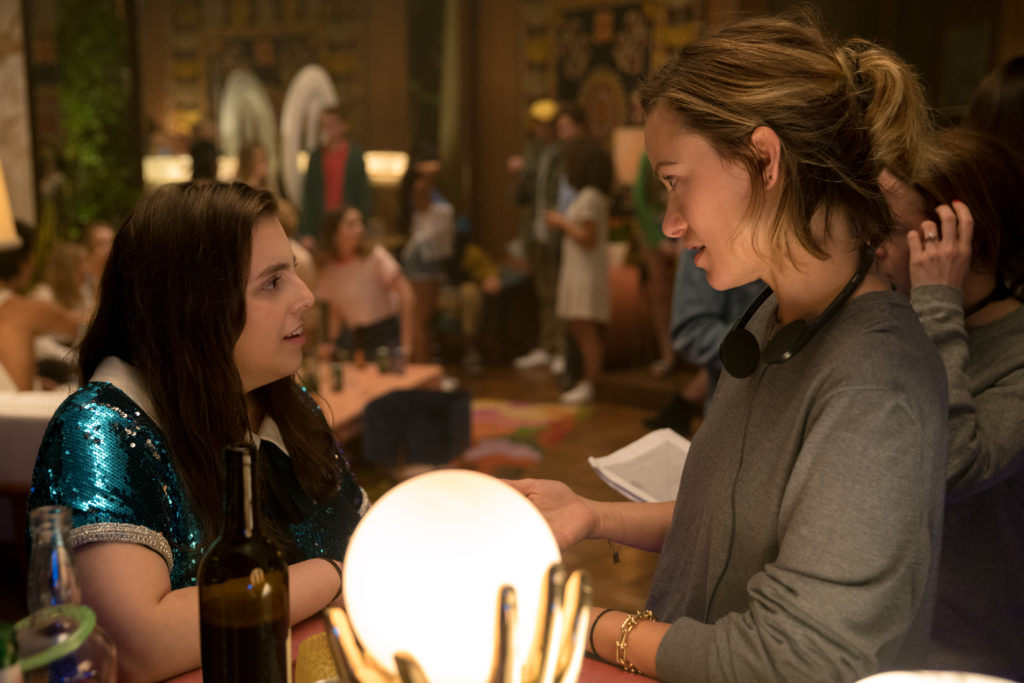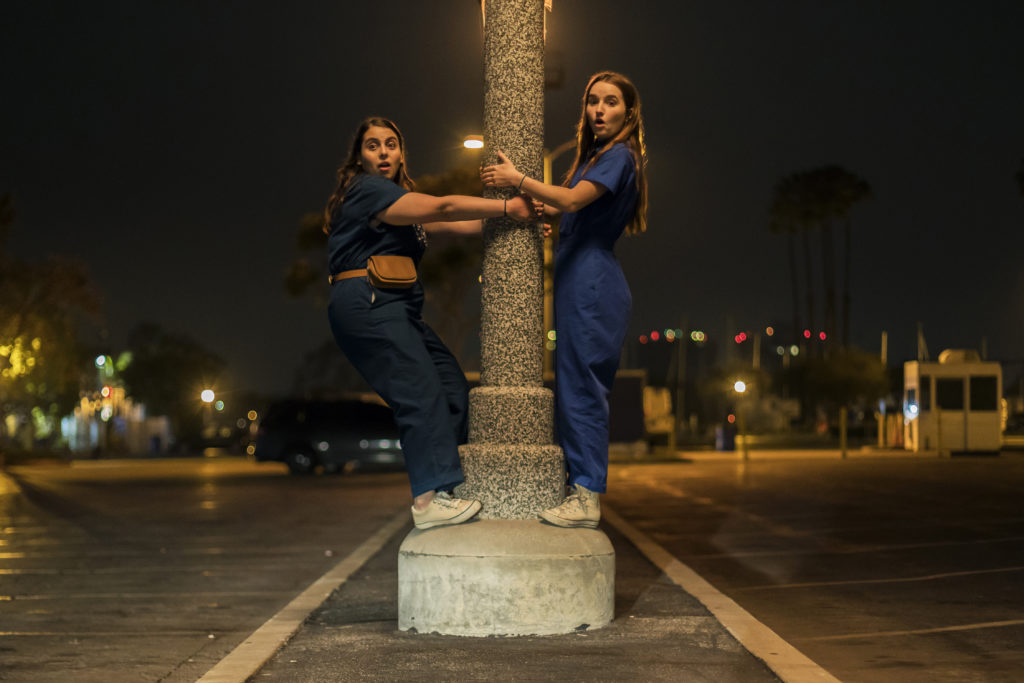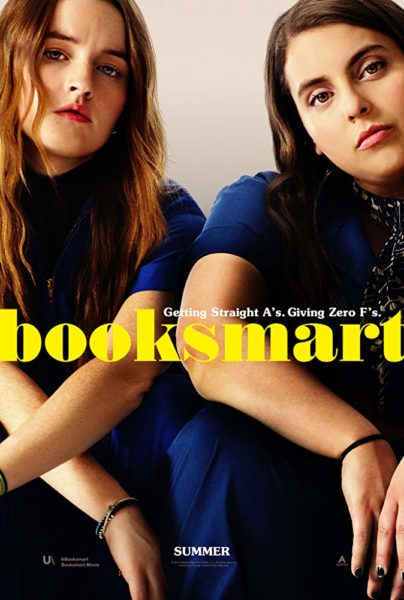Best friends Amy (Kaitlyn Dever) and Molly (Beanie Feldstein) have spent the last four years spurning parties in favor of studying. The purpose of avoiding all the raunchy fun of high school was to get into top-tier colleges—which looks kind of silly in retrospect, once they find out that all the people they’ve been judging as slackers have gotten into excellent colleges too. Cue a mad game of catch-up, as Amy and Molly try to fit four years of typical high school rule breaking into one last night.
The feature directorial debut of actress Olivia Wilde, Booksmart was co-produced by Jessica Elbaum, who in 2014 founded the production company Gloria Sanchez Productions. Sister company to Will Ferrell and Adam McKay’s Gary Sanchez Productions, Gloria Sanchez has as its goal the elevation of female voices in comedy. In addition to Wilde, Gloria has given the mic to Leslye Headland (Sleeping with Other People), Atsuko Hirayanagi (Oh Lucy!), Lorene Scafaria (the upcoming Hustlers), and Booksmart scribe and producer Katie Silberman. Having previously written rom-coms Set It Up and Isn’t It Romantic, Silberman thought it was about time to take her genre-skewering eye to the world of high school comedies. The result is a sharp, funny, and ebullient film from Annapurna Pictures that hits theaters on May 24.
How did you both come to be involved with this project?
Jessica Elbaum: The script has been around for a very long time. I got called by Annapurna probably three-ish years ago. At the time it was a very different project. Susanna Fogel was attached as a writer and director, and at that point it was just Kaitlyn. Beanie was not a part of it. We were putting it together and then, as these things do, it fell apart. We needed a new director. I had been friends with Olivia Wilde. She and I were developing a Comedy Central show together. And one day I just had this brainstorm come to me: “She should read Booksmart!”
And that was it. She read it, she loved it. And I said, “I really want to pitch you to Annapurna to direct this. And she nails her pitch, and they hired her. It was one of those beautiful things, like—“Oh. This is why I started this company. To give people like Olivia an opportunity.” I just knew she had it in her to direct an incredible movie, and she obviously did. It’s the most competent, impressive directorial debut I’ve ever witnessed. I was blown away.
Katie Silberman: I first heard about the project in the fall of 2017 from Jessica Elbaum, who I’d been a huge fan of for so long. I had just met her and was really excited to be in her orbit in any way. When it came to me, the email said it was going to be a project of Annapurna and Gloria Sanchez, which was already so exciting. And that Kaitlyn Dever was attached to play Amy, which made it even more exciting. And that Olivia Wilde was going to direct it. So at that point I nearly chucked my laptop out the window. That’s a fever dream! That’s the dream team!
I’m a big fan of Susanna [Fogel]’s. I love The Spy Who Dumped Me. I love Life Partners. When I spoke to Olivia and Jess and Annapurna, they said that they were excited to take the script in a new direction with Olivia attached, because she had such a clear vision of the kind of movie she was going to make. Listening to her talk about it and looking at the images she had pulled and the things she was excited about, I wanted to watch that movie. I was really thrilled to potentially get to be a part of it.
I also had been hoping to write a high school movie myself. They’re the movies that made me want to make movies: Clueless and Mean Girls and Dazed and Confused. I felt so lucky coming off Set It Up. I had wanted to make a romantic comedy, and I got to do it with such extraordinary people. Next on my list of what I wanted to do was a classic high school movie.
I was able to pitch to Olivia and to the studio the version that I would want to tell, which is examining what it’s like for young, smart women right now. In this generation, they’re for all intents and purposes allowed to be smart. It’s not something they have to fight against anymore. But what does that mean? And when you focus so hard on being book smart, what are you missing by not getting real-world experience? That was a very personal story for me. I was a total Molly. So focused on school. I was such a little type-A nerd from birth, basically. When I got to college and later moved to New York, that’s when I learned the most. I had so little experience in high school, because I was so focused on books. In a lot of ways, writing Booksmart was wish fulfillment; it’s what I had hoped had happened to me before I went off to college.

What impressed me about Wilde as a first-time director is that so many experienced comedy directors don’t really have a visual style. So many modern comedies just look meh. Booksmart has such a distinct, almost dreamy visual aesthetic.
JE: What Booksmart reaffirmed for me is, oh right, comedies can also look good! They can be funny, but they can also have style. They don’t have to be bright and glossy, and the camera doesn’t have to not move. She, honestly, I think, has reinvented comedy.
Katie—you’re someone who’s written romantic comedies before, and though Booksmart doesn’t fall exactly into that genre, it still has romantic elements. Is there a difference in how you approach writing rom-coms with adult characters versus teenagers?
KS: I would say the difference is how self-aware people are. A lot of what I love about rom-coms is people meeting someone who forces them to be the best version of themselves. Those are my favorite kinds of rom-com couples, whether it’s Tom Hanks and Meg Ryan in You’ve Got Mail or Katharine Hepburn and Cary Grant in The Philadelphia Story. With young people, they’re not as hardened as to who they think they are. When you’re meeting in your 30s or 40s, or even your 20s, you have a sense of who you are, and meeting the person who forces you to be the best version is a harder journey. Younger people are more open to the world, and so it’s much easier for them to fall in love. That’s exciting to write, because … it’s so much more open and new and fresh.
When I came on, one thing I pitched to Olivia was: “This is a relationship story. This is a romance. This movie should be structured like a rom-com for Molly and Amy, because they are the love story.” There are other love stories, but they’re the love story. Once we zeroed in on that and were able to write it as a love story, it cracked open a lot about the movie.
Over the last few years, we’ve gotten some really good coming-of-age movies about teenage girls—Booksmart, Edge of Seventeen, Lady Bird—that were directed by women. How important do you think having a female director is in telling these stories?
JE: I think very. It’s always going to feel more real and authentic when you’re telling a story about a woman and it’s in a woman’s hands. That’s not to say that men can’t make great movies about women. But I do think that there’s something a little more organic and authentic when a woman is directing a woman. Especially when it’s a high school story, this angsty period of time that all of us go through. Olivia and Katie, all of us really, pulled from our own experiences. That was super helpful in making it feel real.
With Gloria Sanchez, do you actively push for projects to have female directors?
JE: I always try and hire women, because I enjoy working with them and I want to create opportunities. That having been said, I’m in New York right now making a movie that’s written and directed by a woman, Lorene Scafaria, this movie called Hustlers. The movie I’m going to make after that is written by Kristen Wiig and Annie Mumulo, and they’re going to star in it, but a man’s directing it. He was the right person for that job. There are going to be times when I hire men. When I can, I always hire women. But yes, the goal of my company is to always have a strong female presence on all projects.
It’s all about opportunities. As long as you’re in a situation where women have opportunity, hiring men doesn’t have to be a problem.
JE: I genuinely enjoy working with men, too. And I think that they bring something great to the table as well. For me, it’s who’s the right person for the job? My gut was that [Olivia Wilde] was, and that’s what I went with.
Where did that come from? What was it about her that convinced you she could do it?
JE: She is the most impressive, competent, confident person I have ever met. She’s also got a vast knowledge of film. I just knew. I knew that she would be a great leader, too. And that’s half the battle with directing. To be a really great leader and to create a really good environment for your actors, for your crew, for everybody. Spending time with her and watching her interact with people. What I was able to do with Booksmart and Olivia is literally why I started Gloria Sanchez.

What was different about earlier versions of the script?
JE: The big thing that Katie brought to it was the bit about all of them going to good schools. That’s the DNA of this movie: “Don’t judge a book by its cover.” That was one of the biggest changes that she made. And updating the voices and really writing for Beanie and Kaitlyn and the cast. She made it so the words seem like they were coming out of these girls’ mouths. She spent time with them and really wrote for them. But that don’t judge a book by its cover, we’re all going to great schools—[the line] “I’m incredible at hand jobs, but I also got a 1560 on the SATs.” That’s Katie Silberman.
KS: So much of this movie was about these two main characters realizing they had put people in boxes, just as they had assumed people had put them in boxes. Everyone’s a little scared, and it’s easy to think you understand who everyone is. Part of the fun of making this movie was that both Molly and Amy have these archetypes and these stereotypes of who everyone else is. But so do the moviegoers—from having watched all these high school movies. Being able to peel back the layers for the characters and the viewer at the same time was a really fun challenge.
We’ve definitely been taught from teen comedies that there’s the jock, there’s the rich bitch, there’s the nerd. Booksmart started with that and then deconstructed it.
KS: Yeah, that’s exactly what we did. Once you’re out of that petri dish of high school, it’s fun to speak to people and hear who [other] people thought they were in high school versus who they thought they were in high school. We rarely get to see the multidimensionality of that. There are people who everyone thinks are cool or wild and are actually [also] really smart. Or there are people who are really smart and [turn out to be] just as wild and fun and cool as anyone else. Your best friends are really the only people who see all of your dimensions. [Booksmart is a] story with a best friendship like that at its core; it not only fleshes out the multidimensionality of these bright young women but then sends them on a journey to realize they should give everyone else that benefit of the doubt.
Nobody’s a terrible person in this movie, which is unusual compared to a lot of teen comedies.
KS: There’s no bad guy. In high school, and in life, it’s so easy to put people in boxes. But it was a really clear objective for us that there would be no assholes, no bad guys, no secret, bad things happening. Everyone’s just doing their best.
Jessica, it’s been five years now since you launched Gloria Sanchez. What have those five years been like for you?
JK: The coolest part about it is that we did it before #MeToo and Time’s Up and before the conversation was really active. That’s what I’m the most proud of, that it wasn’t in reaction to this movement. It was genuinely born out of our belief and our passion that there needed to be a place that existed to create opportunities for women in front of and behind the camera. To see how much people love it and have really embraced it is the greatest.
I always roll my eyes a bit when anybody says it’s a “golden age” for a particular genre. With female-directed comedies, it’s not like Amy Heckerling and Penelope Spheeris never made movies. But it does feel like there’s something in the air right now, with more women getting the chance to break in.
JE: I could not be happier with where I am and what I’m doing. It feels good, and people are embracing it and want it. It’s the most exciting time to be doing what I do. It’s also great because there’s so much talent out there. To be one of the premier places that women want to be makes me so grateful.



Share this post